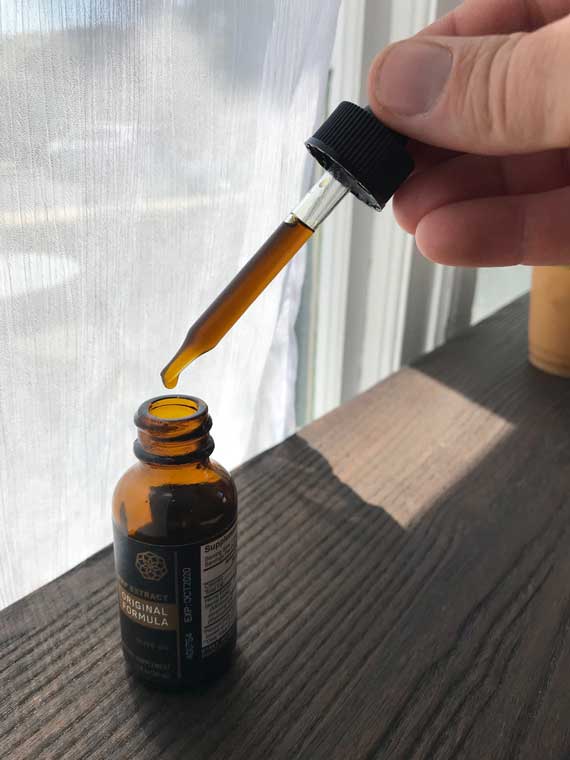updated: 3-25-2020
CBD continues to take the world by storm.
This fascinating chemical is naturally produced in the cannabis plant. It doesn’t make you high but CBD does engage with our human physiology in a meaningful way. As a research biologist and a botanist, I’ve been highly entertained watching so much public interest focus on this plant derived chemical.
Some people will tell you that CBD can cure everything from arthritis to cancer while others will tell you it does nothing at all.
So who is right and who is wrong?
Well, like most things…. the truth lies somewhere in the middle.
CBD science is maturing
Last year, I was hired as the Chief Science Officer for a CBD company. To prepare for this position, I read a lot of published scientific reports on CBD.
It turns out there is a huge body of literature on the subject. Much of this experimental work has been carried out in cell culture and animal models, like mice and rats. However, recently we are beginning to see CBD experiments carried out on humans. That is a step in the right direction. In general, I am never really convinced of anything unless I see large clinical trials performed with placebo controls.
We are still in the early days of CBD science and that’s okay. CBD research is following the normal journey of scientific exploration.
When we want to learn about the health benefits of any new chemical, we generally start experiments in the laboratory with cells in a dish. This is a cheap and easy way to get a biological answer. Then, if those results look promising, scientists will move on to animal research and hope that the exciting results are repeatable in a live mammal. Once the animal work looks convincing, scientists can put together funding to initiate a small trial on human patients. In general, this is about where CBD science is at today.
We have seen very encouraging results in animal research and small clinical trials with human patients. Now, larger groups with access to funding are beginning to put together larger clinical trials.
What is CBD?
CBD is an abbreviation for cannabidiol. Cannabidiol is a non-intoxicating and non-addictive chemical from the cannabis plant.
I know what you’re thinking…doesn’t cannabis make you stoned? Well, yes, but THC is the chemical in cannabis that makes you high. When you remove THC from cannabis then consuming the plant does not make you high, not at all. Just like removing alcohol from a beer to avoid drunkenness.
When you purchase pure CBD or hemp extract with 0% THC, you are getting the non-THC components of the cannabis plant.
Why would you want to consume the non-THC chemical components of the cannabis plant?
Well, it turns out, there are some impressive health benefits associated with these chemicals. There are about 100 different, non-THC chemicals in cannabis. Many of these chemicals are being studied for potential health benefits.
In this article, I will be focusing on one particular cannabis chemical called CBD.
Below, I will briefly describe how CBD is being explored as a remedy for various health concerns.
Epilepsy
On June 26, 2018 the FDA approved CBD for the treatment of seizures associated with two rare and severe forms of childhood epilepsy, Lennox-Gastaut syndrome and Dravet syndrome, in patients two years of age and older. GW Pharma is the name of the company to develop this CBD drug.
Epidiolex’s effectiveness was studied in three randomized, double-blind, placebo-controlled clinical trials involving 516 patients with either Lennox-Gastaut syndrome or Dravet syndrome. Epidiolex was shown to be effective in reducing the frequency of seizures when compared with placebo.
GW Pharma carried out extensive safety studies on isolated CBD during their clinical work. GW Pharma determined that a dose of 10 mg/kg/day of pure CBD taken orally was generally safe and well tolerated.
The most common side effects that occurred in Epidiolex-treated patients in the clinical trials were: sleepiness, sedation and lethargy; elevated liver enzymes; decreased appetite; diarrhea; rash; fatigue, malaise and weakness; insomnia, sleep disorder and poor quality sleep; and infections.
GW Pharma grows their cannabis in greenhouses in England. CBD is extracted from the plant and purified into an isolated CBD solution. Epileptic children take this CBD orally.
It should be noted that people within the marijuana community had previously observed that smoking cannabis with large amounts of CBD could reduce seizures. Much of this knowledge came from anecdotal evidence. GW Pharma proved this effect was real by testing CBD in large clinical trials.
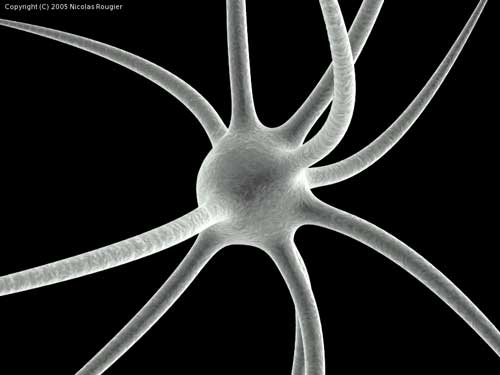
A single brain cell (neuron)
CBD engages with multiple protein receptors on the surface of neurons. In doing so, CBD may alter the activity of neurons in a manner that decreases seizures.* Epidiolex was FDA approved as a drug without a defined mechanism of action. GW Pharma is still studying the exact manner CBD engages with neurons to decrease seizures.
Anxiety/Stress
Stress and anxiety are our body’s reaction to a challenging situation. This reaction tends to be unpleasant. When we’re stressed or anxious we feel a tension or tightness throughout our body. A little bit of stress and anxiety can be helpful as it keeps us on our toes. However, health problems arise when we experience long term (chronic) stress or anxiety.
CBD is currently being studied for it’s potential to reduce chronic stress or chronic anxiety. If CBD can engage with neurons in a way that reduces their activity (firing rate) then it makes sense that CBD could also induce a sense of calm for a typically stressed or anxious person. We also know that CBD engages with serotonin receptors, therefore, CBD may engage our serotonin pathway in order to lower stress/anxiety.* These behaviors and cell activities are currently being explored in laboratory and small studies.
- One report demonstrates that CBD can reduce the stress associated with public speaking events. A small experiment was conducted on human subjects. CBD treatment reduced anxiety in people with social anxiety disorder. This CBD treatment was comparable in effectiveness to ipsapirone, a drug that activates serotonin receptors (Bergamaschi 2011).*
- Another report showed that CBD can decrease the heart rate and blood pressure in animals that are held in a stressful position. Scientists systemically administered CBD and this treatment reduced the heart rate and blood pressure normally experienced by mice that were held uncomfortably in physical restraints. CBD also delayed the anxious effect normally observed when mice partake in an elevated maze. The scientists also noted that these CBD effects seemed to be acting through the serotonin pathway (Resstel, 2009, Granjeirio, 2011).*
If you’re interested in finding a high quality brand of CBD, you will appreciate this guide I’ve recently put together.

image: Wellcome Images, Wikimedia Commons
This is the look of acute stress or chronic anxiety. Eventually stress will drag our body down and threaten our good health. Meditation helps many people. Some people report improvements with CBD.*
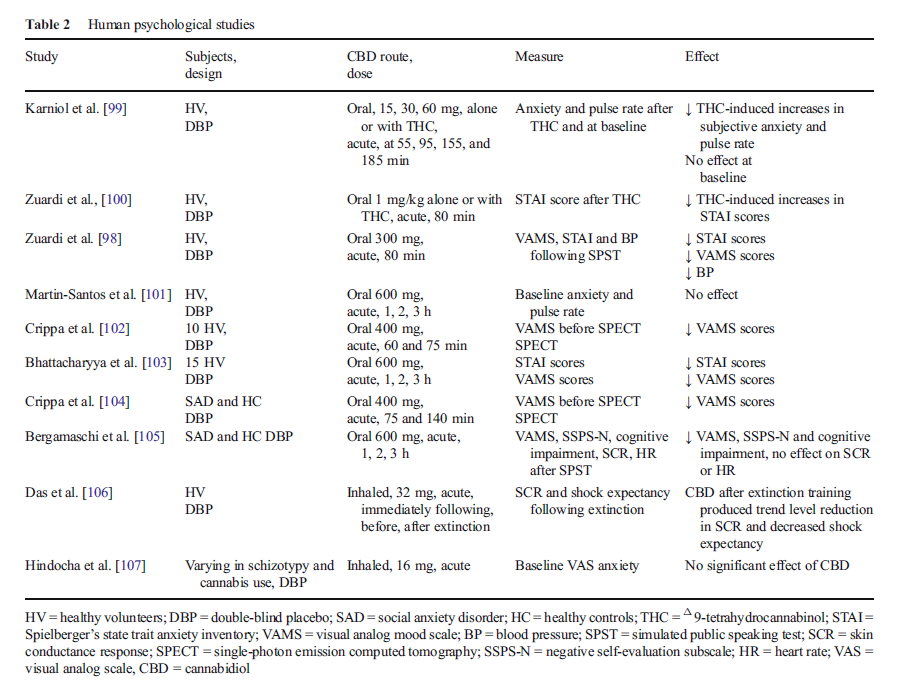
Table documents human trials published on CBD and stress/anxiety
Reference: Blessing, 2015
Chronic Pain
Pain is a unpleasant sensation in our nervous system. Chronic pain is defined as any pain lasting more than three months. Pain is often our body’s way to tell us something is wrong and needs to be fixed. For example, if a tooth is hurting, this could mean we need a root canal. However, sometimes nothing is wrong with our body but our pain pathways are still being activated. In these scenarios, it would be nice to be able to reduce this chronic pain.
CBD is currently being studied for its ability to decrease chronic pain.
The exact manner that CBD interacts with our pain sensing systems is not fully understood, however reports demonstrate that CBD interacts with various cell receptors (TRPVI, serotonin 1A, etc.) to confer a therapeutic effect.*
We know that COX-2 enzymes and prostaglandins are key components of our pain sensing system. Interestingly, one report demonstrates that CBD can decrease levels of COX-2 enzymes and prostaglandins (Costa, 2004).*
Personally, I use a CBD salve on my knees and joints after intense physical activity. I also use menthol salves and I find CBD delivers a similar but more moderate effect as compared to menthol. The advantage is my house doesn’t stink like menthol when I use the CBD salve. Try for yourself!
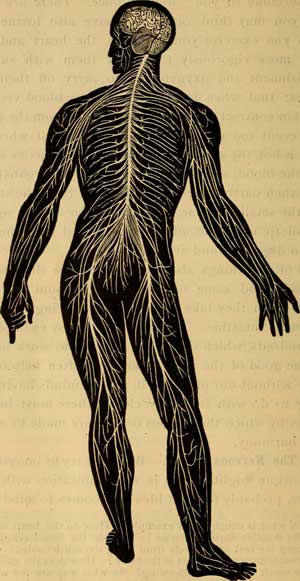
Our nervous system can detect harm or discomfort throughout our body. Upon detection, our nervous system then sends an electrical signal to our brain, which we interpret as pain.
Insomnia
In my opinion, sleep is one of the best remedies for poor health. Without good sleep, my brain is worthless and my body can’t do much more than walk around in a half-zombie trance.
Therefore, I will try anything that can possibly improve sleep.
I want at least 7 hours of deep sleep and I don’t always get it…
Preliminary evidence suggests CBD can be beneficial for total sleep time.*
One group tested various doses of CBD on the sleep cycle of adult rats. The rats were randomly distributed into four groups that received injections of CBD 2.5 mg/kg, CBD 10 mg/kg, CBD 40 mg/kg or vehicle. Sleep recordings were made during light and dark periods for four days. The data demonstrate that systemic administration of CBD appears to increase total sleep time (Chagas, 2013).* These results need to be repeated with human subjects and a cbd randomized controlled trial.
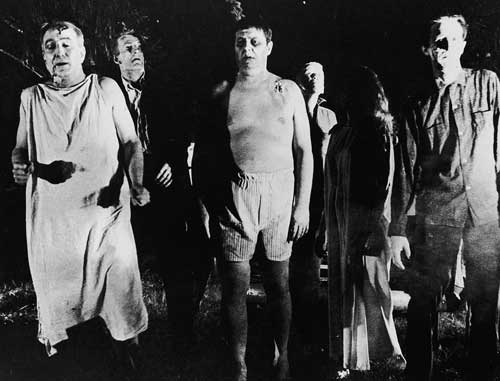
Insomniacs sleep poorly and walk around like zombies in the daytime.
Can CBD help?
If you’re interested in finding a high-quality brand of CBD, you will appreciate this guide we recently put together.
The EthnoHerbalist Guide to finding a quality CBD brand
In the future, I will be adding more topics and science to this page. Please bookmark page and check back later!
I heard some people suffering with neurodegenerative conditions use CBD to decrease shaking or muscle spasms.* I also know there are currently clinical trials underway to determine the effectiveness of CBD to treat spasticity related to multiple sclerosis.* I will include this content once these trials conclude.
Also keep in mind, we all have different body physiology and unique human genomes and those differences will modulate the way we respond to a potentially therappeutic chemical like CBD. To put it simply, some people report positive benefits of drugs or herbs while others feel nothing. CBD is no different. Even a high dose will do nothing beneficial for some people…so it goes.
*These statements have not been evaluated by the Food and Drug Administration. This product is not intended to diagnose, treat, cure or prevent any disease.
Curious about federal regulation of CBD?
I have created this FDA and CBD page, which I will update with all major developments as the FDA decides how to manage CBD.
Have I left out some interesting science on CBD? Please feel free to share with me! You can contact me via this page.
References
Bergamaschi, Mateus M., et al. “Cannabidiol reduces the anxiety induced by simulated public speaking in treatment-naive social phobia patients.” Neuropsychopharmacology 36.6 (2011): 1219.
Blessing, Esther M., et al. “Cannabidiol as a potential treatment for anxiety disorders.” Neurotherapeutics 12.4 (2015): 825-836.
Chagas, Marcos Hortes N., et al. “Effects of acute systemic administration of cannabidiol on sleep-wake cycle in rats.” Journal of Psychopharmacology 27.3 (2013): 312-316.
Costa, Barbara, et al. “Oral anti-inflammatory activity of cannabidiol, a non-psychoactive constituent of cannabis, in acute carrageenan-induced inflammation in the rat paw.” Naunyn-Schmiedeberg’s archives of pharmacology 369.3 (2004): 294-299.
Granjeiro, Erica M., et al. “Effects of intracisternal administration of cannabidiol on the cardiovascular and behavioral responses to acute restraint stress.” Pharmacology Biochemistry and Behavior 99.4 (2011): 743-748.
Hanuš, Lumír Ondřej, et al. “Phytocannabinoids: a unified critical inventory.” Natural product reports 33.12 (2016): 1357-1392.
Millar, S. A., et al. “A systematic review of CBD science dosing in clinical populations: cbd randomized controlled trial.” British Journal of Clinical Pharmacology (2019).
Resstel, Leonardo BM, et al. “5‐HT1A receptors are involved in the cannabidiol‐induced attenuation of behavioural and cardiovascular responses to acute restraint stress in rats.” British journal of pharmacology 156.1 (2009): 181-188.
Shannon, Scott, et al. “Cannabidiol in anxiety and sleep: a large case series.” The Permanente journal 23 (2019).

